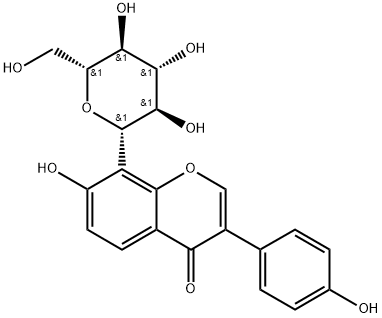Puerarin: A Multi-Faceted Neuroprotective Compound for Treating Neurodegenerative Diseases
May 8,2024
General Description
Puerarin, derived from Pueraria lobata, demonstrates significant neuroprotective effects in various neurological conditions. It exhibits anti-apoptotic activity by reducing neuronal cell death, balancing pro- and anti-apoptotic factors, and modulating key signaling pathways. Additionally, puerarin shows anti-autophagic properties by inhibiting autophagy formation and promoting neuronal survival. Moreover, puerarin exerts a protective effect against neurodegenerative diseases like Alzheimer's and Parkinson's by targeting protein accumulation, enhancing enzyme activity, and preserving dopaminergic neurons. Overall, puerarin emerges as a promising therapeutic agent for neuroprotection and disease treatment in diverse neurological disorders.

Figure 1. Puerarin
Anti-apoptotic activity
Puerarin, a natural compound derived from the plant Pueraria lobata, has been shown to possess significant anti-apoptotic activity in various neurological conditions. Apoptosis, a programmed cell death process crucial for maintaining cellular homeostasis, is dysregulated in many diseases, including neurodegenerative disorders like Alzheimer's disease (AD) and cerebral ischemia. Puerarin exerts its anti-apoptotic effects through multiple mechanisms. In a mouse model of subarachnoid hemorrhage (SAH), puerarin treatment reduced apoptotic neuron death, increased the Bcl-2/Bax ratio, and inhibited cleaved caspase-3 expression, thereby protecting against brain injury. Additionally, puerarin decreased reactive oxygen species (ROS) generation and enhanced antioxidant enzyme activity, further contributing to its neuroprotective effects in SAH. In animal models of cerebral ischemia, puerarin administration led to reduced infarct volume, improved neurological function, and inhibition of caspase-3 activity. Puerarin also up-regulated the expression of anti-apoptotic proteins like XIAP, Bcl-2, and MCL-1, while down-regulating pro-apoptotic factors such as Bax, thereby promoting cell survival in ischemic conditions. Moreover, puerarin modulates various signaling pathways involved in apoptosis regulation, including the PI3K/Akt, ERK/MAPK, and GSK-3β pathways, to exert its anti-apoptotic effects. By targeting these pathways, puerarin enhances neuronal survival, reduces apoptosis, and improves cognitive function in neurological disorders like global cerebral ischemia, epilepsy, and AD. Overall, puerarin demonstrates promising anti-apoptotic activity in diverse neurological conditions, highlighting its potential as a therapeutic agent for neuroprotection and disease treatment. 1
Anti-autophagic activity
Puerarin exhibits significant anti-autophagic activity in various neurological conditions. Autophagy, a cellular process crucial for maintaining cellular homeostasis and organelle renewal, plays a dual role in cell survival and death, with dysregulation implicated in various neurodegenerative disorders. Puerarin's anti-autophagic effects have been demonstrated in ischemic stroke models and alcohol-induced cognitive impairment studies. In ischemic stroke, puerarin attenuates neuronal autophagy by suppressing the expression of LC3-II and reducing the LC3-II/LC3-I ratio in the ischemic penumbra. This modulation of autophagic markers indicates puerarin's ability to inhibit autophagy formation and potentially salvage autophagic cells in the penumbra, offering a novel approach for stroke treatment. Furthermore, puerarin exerts neuroprotective effects in alcohol-induced cognitive impairment by inhibiting autophagy through promoting the expression of Beclin1 and modulating the mTOR/JNK signaling pathway. By reducing the formation of autophagosomes and altering key autophagy-related protein levels, puerarin enhances neuronal survival and cognitive function in this model. Overall, puerarin's anti-autophagic properties highlight its potential as a therapeutic agent for targeting autophagy dysregulation in neurological disorders, offering new insights into neuroprotective mechanisms and potential treatment strategies for conditions involving aberrant autophagy pathways. 1
Protective effect against neurodegenerative diseases
Puerarin exhibits a promising protective effect against neurodegenerative diseases such as Alzheimer's disease (AD) and Parkinson's disease (PD). In both conditions, the accumulation of specific proteins in nerve cells leads to their degeneration and eventual death, resulting in cognitive and motor impairments. In AD, puerarin treatment has been shown to inhibit the expression of amyloid-beta (Aβ), a key protein involved in the formation of senile plaques, while also increasing the activity and expression of choline acetyltransferase (ChAT), an enzyme important for cognitive function. Additionally, puerarin reduces the hyperphosphorylation of tau protein, which is associated with neurodegeneration and memory deficits in AD. In PD, puerarin helps restore dopamine levels by enhancing dopamine production and protecting dopaminergic neurons from degeneration. It also ameliorates behavioral deficits and dopamine depletion induced by toxins like MPTP and 6-OHDA, suggesting its potential as a therapeutic agent for PD. Furthermore, puerarin promotes the proliferation, differentiation, and survival of dopaminergic neurons, offering a multifaceted approach to neuroprotection against both AD and PD. These findings highlight the potential of puerarin as a natural compound for mitigating the progression of neurodegenerative diseases. 2
Reference
1. Liu X, Huang R, Wan J. Puerarin: a potential natural neuroprotective agent for neurological disorders. Biomed Pharmacother. 2023; 162: 114581.
2. Zhang Y, Chen Y, Shan Y, Wang D, Zhu C, Xu Y. Effects of puerarin on cholinergic enzymes in the brain of ovariectomized guinea pigs. Int J Neurosci. 2013; 123(11): 783-791.
- Related articles
- Related Qustion
- Puerarin in the root of kudzu: pharmacokinetics and adverse effects Jan 23, 2024
Puerarin is a flavonoid extracted from the root of kudzu with therapeutic effects, but low bioavailability. Caution needed in pregnancy.
- Puerarin: Preparation, Pharmacological Action and Application Studies Mar 7, 2023
As a isoflavonoid compound, puerarin with strong biological activities was isolated from Gegen in the late 1950s.Currently, there are three main dosage forms of puerarin for clinica applications.
Diphenylmethane, found in potatoes and soybeans, has therapeutic potential for insulin resistance via PPARα and PPARγ agonism, synthesized via Suzuki coupling.....
May 8,2024APISodium pyruvate is vital in biochemistry, cell culture, and clinical uses, supporting energy production, cell growth, and alleviating allergic rhinitis symptoms.....
May 8,2024APIPuerarin
3681-99-0You may like
- Puerarin
-

- $0.00 / 1kg
- 2024-05-24
- CAS:3681-99-0
- Min. Order: 1kg
- Purity: 98% 95%,90%
- Supply Ability: 1000
- Puerarin
-

- $0.00 / 1KG
- 2024-05-23
- CAS:3681-99-0
- Min. Order: 1KG
- Purity: 98
- Supply Ability: 5tons
- Puerarin
-

- $0.00 / 1kg
- 2024-05-21
- CAS:3681-99-0
- Min. Order: 0.10000000149011612kg
- Purity: ≥99%
- Supply Ability: 20tons




